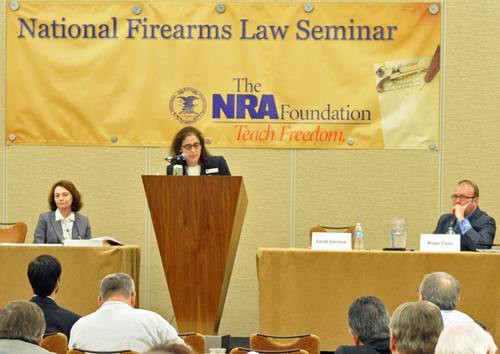First up is Sarah Gervase, who has worked in the Office of General Counsel ten years, and is talking about ATF 41F and Trusts. If you recall, 41F was ATF’s proposal to require background checks on Trusts for “responsible persons,” and also proposed to eliminate CLEO sign-off in favor of CLEO notification. She goes over some of the history of the National Firearms Act. She recommends if you’re an attorney, getting a copy of the paperwork for NFA items. Apparently it’s not uncommon for gun collectors to also hoard collect other things, and for family upon death to tell family attorney’s “We’re pretty sure this is legal and registered, but it’s going to take us a year to find the paperwork,” and there’s a limited period of time in which the transfer can be legally affected.
There were some smaller changes to 41F that many readers might not know about. ATF codified existing policy that when an NFA owner dies the executors of the estate is permitted to possess the firearm during probate without it being considered a “transfer.” She warns though that only the executor of the estate can keep the NFA item. They cannot designate a third party to look after it.
The big sticking issue is what constitutes a “responsible person.” She notes that the beneficiary of a trust doesn’t count as a “responsible person” provided that they don’t have the legal capacity to direct the trust, possess, transport, etc the NFA item. She does note that if you add responsible persons to an existing trust, you can do so without notifying ATF, however you will upon another application to make or application to transfer.
Another interesting detail is that while NFA forms are considered protected tax documents, the CLEO notification documents are not, and the CLEO can do what they want with them.
She notes that a common misconception is that ATF has a 24 month rule that if a trust is unchanged, the responsible persons don’t have to go through the background check again. This is not true. This only applies to submitting trust documents. Responsible persons have to go through a check each time there’s an application to make or transfer.
Question of the day: “Can I be buried with my guns?” Apparently there can be, in some states, safe storage implications! There’s also an issue with who is in possession of the firearm.
The next panelist, Brent Weil, is speaking about first party and third party liability claims against firearms instructors. Starting with a few videos which represent great examples of high derp, he dives right into negligent training. There has been a great increase in demand for firearms training, lead by the substantial growth in new shooters, including the 271% increase in gun ownership among women. What is negligent training:
- Range defects. Trip and fall is a common liability. When you’re directing a student, that is potentially your liability.
- Firearms incidents – accidental discharge, mechanical failures, eye and ear protection.
- Inappropriate tactics.
- Improper use of deadly force – legal issues and advice.
- Lack of proficiency by student.
First party claims are brought by students against instructors. He points out that lawsuits in this area have not been common, but these are potential areas of liability. There have been many cases involving law enforcement, which could be potentially applied to civilian shooters. There is also third party liability claims, where a third party that was harmed by a student sues the instructor for negligent training.
It would seem obvious, but instructors should seek the limited liability of corporations and LLCs, but he notes that won’t necessarily protect from liability, just as a GM employee who gets into an accident delivering a car is still liable for harm caused to others, even though the employee was acting on behalf of GM.
Other advice is to document what you teach both in the classroom and on the range, don’t teach beyond what you’re certified to teach, get students to sign releases, and get insurance.


…there can be, in some states, safe storage implications!
The permanent residents of many mausoleums in older cemeteries would agree. Less valuable things have been ripped off from them in many cases.
If you really care about it, make it a family heirloom rather than trying to take it with you.
You never know, you might need a piece in the afterlife…
It’s hard to find well-informed people on this subject,
but you sound like you understand what you’re talking about!
Thanks